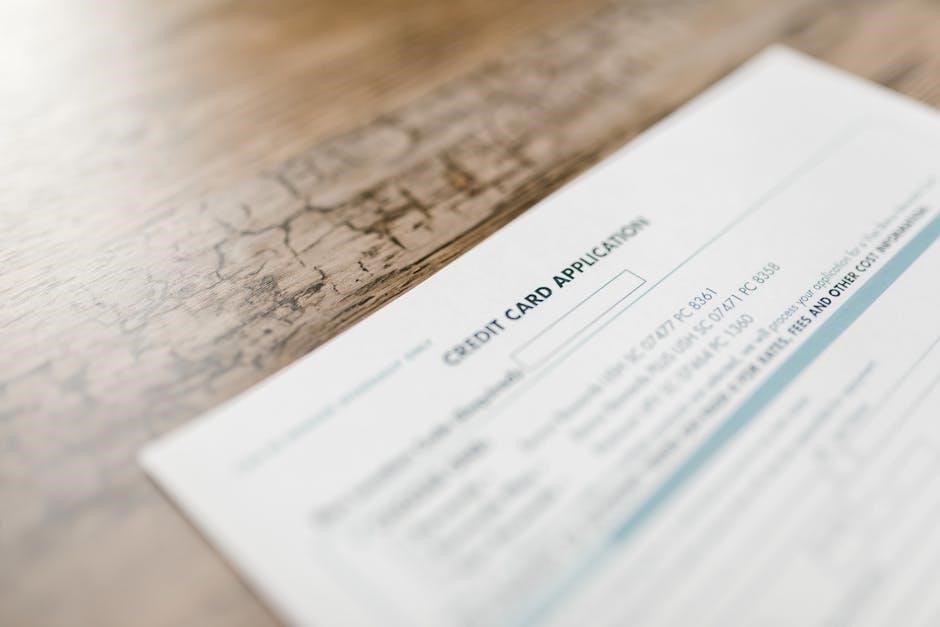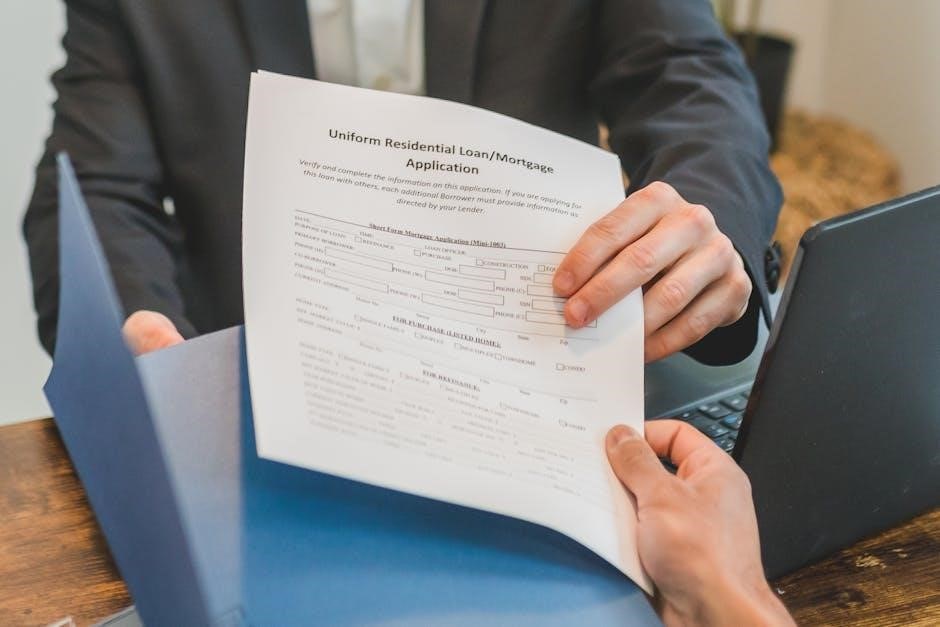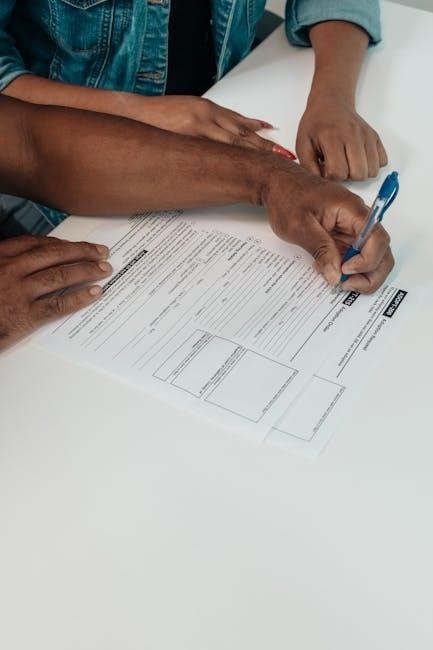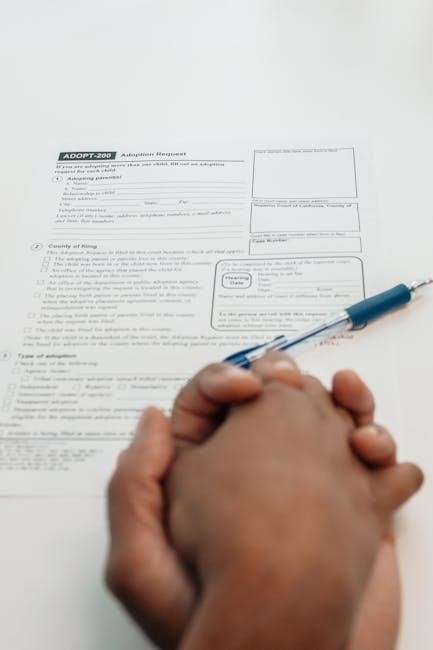The Stolen Generation Application Form QLD is a vital tool for survivors to seek recognition, compensation, and support․ It helps address historical injustices and promotes healing for affected communities․
1․1 Overview of the Stolen Generation

The Stolen Generation refers to Aboriginal and Torres Strait Islander peoples forcibly removed from their families as children under government policies from the 1900s to 1970s․ These traumatic separations aimed to assimilate Indigenous children into Western culture, causing profound emotional, cultural, and social harm․ Survivors often experienced institutionalization, loss of identity, and intergenerational trauma․ The Queensland Stolen Generation Application Form is designed to address this historical injustice by providing formal acknowledgment, financial reparations, and support services․ It acknowledges the suffering endured and offers pathways to healing and reconciliation for affected individuals and their families․ This initiative is a crucial step toward redressing past wrongs and fostering a more inclusive society․
1․2 Purpose of the Application Form
The QLD Stolen Generation Application Form aims to provide formal recognition and support to survivors of the Stolen Generation and their families․ Its primary purpose is to facilitate applications for reparations, financial assistance, and access to specialized services․ The form ensures a structured process for gathering necessary information to assess eligibility and provide appropriate support․ It also serves as a means to document survivors’ experiences, preserving their histories for future generations․ By submitting the form, applicants can access benefits designed to address the historical injustices they endured․ This initiative underscores the government’s commitment to acknowledging past wrongs and fostering reconciliation․ The form is a vital tool for delivering justice and healing to affected communities․
1․3 Importance of the QLD Application Process
The QLD application process is crucial for addressing the historical injustices faced by the Stolen Generation․ It provides a formal pathway for survivors and their families to seek recognition and access support services․ By participating, individuals can obtain financial reparations and connect with resources designed to aid healing and rebuilding․ The process also acknowledges the traumatic impact of forced removals, offering a chance for survivors to share their stories․ It ensures that the government takes responsibility for past wrongs, fostering reconciliation and promoting societal awareness․ The application process is a significant step toward justice and healing for affected individuals and communities․

Eligibility Criteria for the Stolen Generation Application
The application is open to Stolen Generation survivors, their descendants, or estates, requiring proof of forced removal and connection to QLD during relevant periods․
2․1 Who Can Apply for the Scheme
The Stolen Generation Application Form QLD is designed for individuals directly affected by forced removal policies․ Eligible applicants include survivors of the Stolen Generation, their descendants, and legal representatives of deceased survivors․ Survivors must provide evidence of their removal, such as historical records or government documentation․ Descendants can apply on behalf of their ancestors, while estates may submit applications for deceased individuals; The scheme prioritizes those with a verified connection to Queensland during the relevant time periods․ Applicants must demonstrate a clear link to the Stolen Generation through personal or familial history․ This ensures the scheme supports those most impacted by these historical injustices․
2․2 Special Considerations for Deceased Survivors
The Stolen Generation Application Form QLD includes provisions for deceased survivors, ensuring their legacy is honored․ Applications for deceased individuals can be submitted by their legal representatives or estates․ Required documentation includes proof of death, such as a death certificate, and evidence linking the deceased to the Stolen Generation․ Historical records, family testimonies, and government documents are often used to establish eligibility․ The process is designed to be sensitive to the emotional impact on families․ Support services are available to assist with gathering necessary documents and navigating the application process․ This ensures deceased survivors receive the recognition and support they deserve, even posthumously․ The scheme prioritizes dignity and respect for all applicants․
2․3 Proving Stolen Generation Status
Applicants must provide evidence to confirm their status as part of the Stolen Generation․ This includes official records, such as birth certificates, government documents, or institutional records․ Personal testimonies, family histories, and community elder statements are also accepted․ Historical records from missions, schools, or other institutions where the applicant was placed are crucial․ In some cases, DNA testing or genealogy reports may be required to establish familial connections․ The Queensland Government accepts photocopies of original documents, but originals may be requested for verification․ Support services can assist in locating and authenticating records․ This process ensures that each applicant’s claim is thoroughly validated while respecting their personal history and experiences․

The Application Process
The application process involves accessing the form, submitting required documents, and following guidelines to ensure eligibility․ Support teams are available to assist applicants throughout the process․
3․1 How to Access the Application Form
The Stolen Generation Application Form QLD can be accessed through the official Queensland Government website․ Visit the dedicated page for Stolen Generations support, where you’ll find a downloadable PDF or an online version․ Ensure you search for “Stolen Generations Application Form QLD” to locate the correct document․ Alternatively, you can request a hard copy by contacting the dedicated assistance team via phone or email․ The form is designed to be user-friendly, guiding applicants through each step; Once downloaded, carefully review the instructions before filling it out․ If you encounter any issues, the assistance team is available to provide support and clarify any questions․ Accessing the form is the first step toward applying for recognition and support․
3․2 Required Documentation for Submission
To complete the Stolen Generation Application Form QLD, specific documentation is required to verify eligibility and support your claim․ Essential documents include proof of identity, such as a birth certificate or government-issued ID․ Historical records, like letters from institutions or government agencies, are crucial to establish your or your family member’s removal․ Additionally, any surviving documentation related to your family’s history, such as photographs or personal records, can strengthen your application․ If certain documents are missing, contact the dedicated assistance team for guidance on alternative evidence․ Accurate and complete documentation ensures your application is processed efficiently․ Gathering these materials carefully is a critical step in the submission process․
3․3 Role of the Dedicated Assistance Team
The Dedicated Assistance Team plays a vital role in supporting applicants throughout the Stolen Generation Application Form QLD process․ This team provides free guidance to help individuals understand eligibility criteria, gather necessary documents, and complete the form accurately․ They also offer cultural sensitivity and respect, acknowledging the emotional challenges of revisiting historical experiences․ The team can assist with tracking application progress and addressing any concerns or questions applicants may have․ Their support extends to connecting applicants with additional resources, such as counselling or legal advice, ensuring a holistic approach to the application journey․ This team is a key resource for navigating the process smoothly and confidently․
3․4 Submitting the Application
Once all required documents are gathered and the form is completed, applicants can submit their application through designated channels․ The QLD Stolen Generation Application Form can be submitted online via the official portal or mailed to the specified address․ Ensure all sections are filled accurately and documents are attached securely․ Late submissions may not be accepted, so adhering to deadlines is crucial․ After submission, a confirmation receipt is provided, which should be kept for records; The Dedicated Assistance Team can guide applicants through the submission process if needed․ Double-checking the application for completeness before submission helps avoid delays in processing․ This step is critical for a smooth and timely review of the application․
3․5 Tracking the Status of Your Application
After submitting the application, applicants can track its status through the official QLD Stolen Generation Application Portal․ A unique reference number is provided upon submission, which can be used to log in and monitor progress․ Updates are also sent via email or SMS, ensuring applicants stay informed․ If no updates are received within the expected timeframe, applicants are encouraged to contact the Dedicated Assistance Team for clarification․ Additionally, applicants can request a follow-up by phone or email to ensure their application is being processed․ Tracking helps applicants stay informed and address any delays promptly․ Regular checks are recommended to ensure a smooth experience․

Support Services for Applicants
The QLD Stolen Generation Application Form offers various support services, including counselling, legal advice, and financial assistance, to help applicants navigate the process smoothly and effectively․
4․1 Free Counselling and Wellbeing Support
The QLD Stolen Generation Application Form provides access to free counselling and wellbeing support to help applicants cope with the emotional challenges of the process․ These services are confidential and designed to address the unique needs of Stolen Generation survivors and their families․ Trained counsellors offer individual or group sessions to assist with trauma, grief, and stress related to their experiences; Additionally, wellbeing programs include workshops on stress management, emotional resilience, and cultural healing practices․ Applicants can access these services in person, over the phone, or via video calls, ensuring accessibility for all․ This support is crucial for those navigating the application process and seeking closure or reconciliation․
4․2 Family History Research Assistance
The QLD Stolen Generation Application Form offers free family history research assistance to help applicants uncover and verify their ancestral connections․ This service is designed to support individuals in tracing their heritage, which may have been disrupted due to forced removals․ A dedicated team assists in accessing historical records, government documents, and cultural archives to reconstruct family trees․ This includes locating birth certificates, adoption records, and other relevant paperwork․ The service also provides guidance on interpreting complex records and connecting with living relatives․ By aiding in the discovery of lost family ties, this assistance plays a vital role in healing and reconciliation for Stolen Generation survivors and their descendants․
4․3 Reunion Organisation Services
The QLD Stolen Generation Application Form includes reunion organisation services to help individuals reconnect with their families and communities․ This initiative provides emotional and logistical support to facilitate reunions, ensuring a safe and meaningful experience․ Trained professionals assist with coordinating meetings, travel arrangements, and communication․ Additionally, cultural advisors are available to incorporate traditional practices and ceremonies, respecting the applicant’s heritage․ The service also offers pre- and post-reunion counselling to address emotional challenges․ These efforts aim to heal historical wounds and restore family bonds, fostering a sense of belonging and identity for Stolen Generation survivors and their descendants․ This support is a cornerstone of the reconciliation process․
4․4 Legal and Financial Guidance
The QLD Stolen Generation Application Form offers legal and financial guidance to assist applicants in navigating the process; Legal advisors provide expert advice on rights, entitlements, and the implications of applying for the scheme․ Financial guidance helps applicants manage any compensation or support received, ensuring it aligns with their personal circumstances․ This includes estate planning for deceased survivors, where beneficiaries may be involved․ The service also covers tax implications and how to access additional financial support programs․ Trained professionals ensure applicants understand their options and make informed decisions․ This guidance is tailored to address the unique needs of Stolen Generation survivors and their families, promoting financial stability and security․

Key Dates and Deadlines
The QLD Stolen Generation Application Form outlines critical deadlines to ensure timely processing․ Key dates include submission cutoffs and notification timelines, streamlining the process effectively․
5․1 Application Window Timeline
The application window for the Stolen Generation scheme in Queensland typically opens on a specific date each year, allowing eligible survivors to submit their claims within a defined period․ The window is designed to ensure fairness and accessibility, providing ample time for applicants to gather necessary documents and seek assistance․ The exact timeline is announced annually, often aligned with significant cultural or historical dates to honor the Stolen Generations․ Extensions may be granted under exceptional circumstances, such as natural disasters or unforeseen delays․ Applicants are encouraged to submit their forms well before the deadline to avoid last-minute issues․ For the most accurate and up-to-date information, visit the official Queensland Government website․

5․2 Important Milestones in the Scheme
The Stolen Generation Application Form QLD has several key milestones that mark its progress and significance․ These include the official launch of the scheme, which aimed to provide recognition and support to survivors․ Another milestone was the first round of applications being accepted, marking a crucial step toward addressing historical injustices․ Additionally, the scheme reached a significant number of successful applications, highlighting its impact and reach․ The program also celebrated the first reunions facilitated through its services, a poignant reminder of its purpose․ Ongoing updates to the application process ensure it remains accessible and effective, further solidifying its importance in addressing the legacy of the Stolen Generation․ These milestones underscore the scheme’s commitment to justice and healing․
5․3 Deadline for Submission
The deadline for submitting the Stolen Generation application form in Queensland is a critical factor to ensure eligibility for the scheme․ Applicants must lodge their completed forms by the specified date, which is typically announced on the official website and through community notices․ Missing the deadline may result in the application being ineligible for consideration․ The Queensland Government encourages applicants to submit their forms well in advance to avoid delays․ For those facing exceptional circumstances, limited extensions may be granted, but this requires formal approval․ It is essential to check the official website or contact the dedicated assistance team for the most up-to-date information on deadlines and submission requirements․

Government Involvement and Funding
The Australian Government has acknowledged the Stolen Generations through official apologies and financial support, while the Queensland Government actively participates in the scheme’s administration and outreach․
Funding is allocated to provide compensation, wellbeing services, and family reunion initiatives, ensuring survivors receive the assistance they need for healing and justice․
6․1 Role of the Australian Government
The Australian Government plays a pivotal role in addressing the historical injustices faced by the Stolen Generation through the application form process in Queensland․ They have acknowledged the profound harm caused by past policies and are committed to reconciliation․ The federal government provides financial support and resources to facilitate the application process, ensuring eligible survivors can access compensation and services․ They also work closely with state governments, including Queensland, to streamline the scheme and ensure its effectiveness․ Additionally, the Australian Government promotes awareness and education about the Stolen Generation’s history, fostering a national understanding of the need for healing and justice․
6․2 Queensland Government’s Participation
The Queensland Government plays a pivotal role in addressing the historical injustices faced by the Stolen Generation through its participation in the application scheme․ They have established specific initiatives to provide financial compensation, counselling, and cultural support to eligible survivors․ The QLD government collaborates with Indigenous organisations to ensure the application process is accessible and culturally sensitive․ Additionally, they fund community-based programs aimed at healing and reconciliation․ This includes providing resources for family reunions and preserving Indigenous histories․ The government’s involvement underscores their commitment to acknowledging past wrongs and supporting the wellbeing of Stolen Generation members and their families․ Their efforts are integral to fostering justice and healing within affected communities․
- Financial compensation and support services are key components․
- Partnerships with Indigenous organisations ensure cultural sensitivity․
- Community healing programs are funded to promote reconciliation․
6․3 Allocation of Funds for the Scheme
The Queensland Government has allocated specific funds to support the Stolen Generation Scheme, ensuring that applicants receive the necessary resources and assistance․ These funds are primarily sourced from government budgets and occasionally supplemented by community contributions․ The allocation is carefully managed to cover compensation payments, support services, and administrative costs․ A significant portion is dedicated to counselling and wellbeing programs, acknowledging the emotional impact on survivors․ Additionally, funds are used to facilitate family reunions and provide legal guidance․ The government ensures transparency in fund distribution, with regular audits and reports to maintain accountability․ This financial commitment reflects the government’s dedication to addressing the historical injustices faced by the Stolen Generation․

The Impact of the Stolen Generation Scheme
The Stolen Generation Scheme acknowledges historical injustices, provides financial redress, and supports healing․ It empowers survivors to rebuild lives and strengthens Indigenous communities․
7․1 Recognition of Historical Harm
The Stolen Generation Application Form QLD is a crucial step toward acknowledging the profound harm inflicted upon Aboriginal and Torres Strait Islander peoples․ The forced removal of children from their families caused lasting trauma, cultural disconnection, and intergenerational pain․ This scheme serves as a formal recognition of these injustices, offering a pathway to healing and reconciliation․ By providing reparations, the Queensland Government acknowledges the historical wrongs and their ongoing impact․ The application process ensures that survivors and their descendants receive the dignity and support they deserve․ It is a vital step in addressing the past and fostering a more equitable future for Indigenous communities․
7․2 Financial and Wellbeing Support
The Stolen Generation Scheme provides financial and wellbeing support to eligible applicants, acknowledging the historical injustices they endured․ Financial assistance includes compensation payments to help survivors rebuild their lives and gain economic stability․ Additionally, wellbeing support is offered through access to counselling services, emotional support programs, and cultural healing initiatives․ These resources aim to address the intergenerational trauma and emotional distress caused by forced separation․ The scheme also offers pathways for applicants to reconnect with their culture and community, fostering a sense of identity and belonging․ This comprehensive support ensures that survivors receive both monetary and emotional relief, helping them heal and move forward․
7․3 Reuniting Families and Communities
The Stolen Generation Scheme plays a vital role in reuniting families and strengthening community bonds․ Many survivors were forcibly separated from their loved ones, leaving deep emotional scars․ The application process includes services such as family tracing and reunion organization, helping individuals reconnect with their heritage and kin․ These efforts aim to heal historical wounds by fostering reconciliation and rebuilding trust․ Additionally, community events and cultural programs are supported to bring people together, celebrating shared experiences and resilience․ By prioritizing reunification, the scheme not only restores personal connections but also revitalizes cultural identities, contributing to the collective healing of Indigenous communities in Queensland․ This initiative is a step toward mending the past and fostering a united future․

Additional Resources and Links
Applicants can access the official Queensland Government website for detailed application guides and downloadable forms․ Contact the Stolen Generations Support Team for personalized assistance․ Explore Indigenous support organizations for further guidance and community resources․ Utilize these links to streamline your application journey and connect with vital services․
8․1 Official Website for Applications
The official website for the Stolen Generation Application Form QLD is the primary platform for accessing resources and submitting applications․ Managed by the Queensland Government, the site provides a secure and user-friendly interface to download forms, review eligibility criteria, and submit required documents․ Applicants can find detailed guidelines, FAQs, and step-by-step instructions to ensure a smooth application process․ The website also offers direct links to support services, including counselling and legal assistance․ Additionally, it includes a section for tracking application status and accessing updates on the scheme․ For convenience, contact information for the dedicated assistance team is prominently displayed․ The site is optimized for accessibility, ensuring all applicants can navigate easily and securely․
8․2 Contact Information for Assistance
The Queensland Government provides dedicated contact information for applicants seeking assistance with the Stolen Generation Application Form․ Applicants can reach the Stolen Generations Reparations Scheme team via phone at 1800 961 411 (Monday to Friday, 9:00 AM to 5:00 PM AEST)․ For email inquiries, contact stolengenerations@justice․qld․gov․au․ Additional support is available through the Link-Up Queensland service, which can be contacted at 07 3908 8144․ Applicants can also visit the Queensland Government’s Indigenous Affairs website for more details․ These resources ensure applicants receive the guidance they need to complete their applications successfully․
8․3 Related Support Organisations
Several organisations provide vital support to Stolen Generations survivors and their families in Queensland․ Link-Up Queensland offers counselling, family history research, and reunion services, focusing on healing and reconnecting Indigenous families․ The Healing Foundation works to address intergenerational trauma through community-based programs and cultural healing practices․ Additionally, Reconciliation Queensland promotes understanding and reconciliation efforts statewide, offering resources and events to support survivors․ These organisations complement the application process by providing emotional, cultural, and practical assistance, ensuring applicants receive holistic support throughout their journey․
The Stolen Generation Application Form QLD offers a vital pathway for healing and reconciliation, providing acknowledgment and support to affected individuals and families․
9․1 Final Thoughts on the Application Process
The Stolen Generation Application Form QLD is a vital step toward acknowledging the historical injustices faced by Indigenous Australians․ Completing the application is a significant decision, requiring careful consideration and preparation․ While the process may seem daunting, it is a crucial opportunity for survivors and their families to seek recognition and support․ The Queensland Government has implemented measures to ensure the process is as streamlined as possible, with dedicated teams available to assist․ Applicants are encouraged to reach out for help if needed, as the scheme is designed to provide closure, financial assistance, and a pathway to healing․ This process honors the resilience of the Stolen Generations and their enduring legacy․
9․2 Encouragement to Apply
Applying for the Stolen Generation Application Form QLD is a significant step toward acknowledging the past and securing a brighter future․ This process offers a chance to address historical injustices and provides access to essential support services․ Eligible individuals are encouraged to take this opportunity to seek recognition and compensation for their experiences․ The application process is designed to be as straightforward as possible, with dedicated teams available to assist at every stage․ By applying, survivors and their families can gain access to financial support, counselling, and resources to reconnect with their heritage․ It’s a meaningful way to honour their resilience and contribute to healing and reconciliation․ Don’t hesitate to reach out and take this important step forward․
